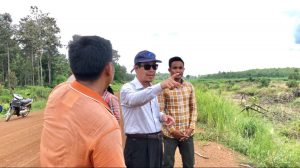A Cambodian court has sentenced a prominent labor union leader and government critic to two years in prison for inciting social unrest, after he made comments about the country’s sensitive border with Vietnam.
Rong Chhun, the president of the Cambodian Confederation of Unions, was arrested at his home in July 2020 after claiming that the demarcation of the border between Cambodia and Vietnam had stripped several farmers of their land.
The following day, Rong Chhun, who is also a member of the Cambodian Watchdog Council, a local civil society group, was charged with “incitement to commit a felony or cause social unrest.”
The Phnom Penh Municipal Court found Rong Chhun and two co-defendants guilty, sentencing the latter to 20 months in prison each. According to the local human rights group LICADHO, Sar Kanika was arrested in August 2020 during a peaceful protest calling for Rong Chhun’s release, while Ton Nimol, a former commune election candidate for the dissolved Cambodia National Rescue Party (CNRP), was arrested in October 2020 during a rally in front of the Chinese Embassy.
The three defendants were ordered to pay nearly $100,000 in combined damages to Cambodia’s border demarcation committee. According to Voice of Democracy, a local news outlet, the three defendants reacted to the court’s verdict by shouting that the verdict was unjust. “It is injustice,” Rong Chhun spoke out in the courtroom. “It is implemented based on a plan and order from the ruler. The court is under the influence of a politician, so the court cannot find justice for me.”
The convictions are just the latest milestones in a grinding political crackdown that has taken place over the past six years, since the ruling Cambodian People’s Party (CPP) suffered serious losses at the national election of 2013. Among the key moments were the effective exiling of CNRP President Sam Rainsy (November 2015), the arrest of his deputy and successor Kem Sokha for treason (September 2017), the dissolution of the CNRP itself (November 2017), and the clean sweep victory of the CPP at national elections (July 2018).
Alongside and between these events, hundreds of opposition members have been arrested, banned from politics, or pressured to defect to the CPP. The government has also tightened the screws against civil society groups and the independent media. In a 2020 report, the U.N. Human Rights Office in Cambodia detailed how the work of human rights and civil society organisations subjected to “undue interference intimidation or harassment.” According to LICADHO, at least 24 human rights defenders are currently in prison.
Today’s court ruling, which can confidently be taken to reflect the views and wishes of Prime Minister Hun Sen and the CPP, also demonstrates the extreme sensitivity that continues to surround the question of the country’s eastern border with Vietnam. Cambodian nationalism has had a strong anti-Vietnamese inflection since its emergence in the early 20th century. Imprinted deeply by French colonial perceptions of Cambodians as a mere faded vestige of the people that built wonders like Angkor Wat, Cambodian nationalism came to be shadowed by a profound fear of disappearance at the hands of its eastern neighbors.
As I noted in a recent article in The Diplomat’s monthly magazine (please subscribe here!), democratic advocacy in Cambodian has long been entwined with ethnonationalist tropes and this fear of extinction under the pressure of Vietnamese encroachments.
This has naturally been a potent line of attack for opponents of Hun Sen and the CPP, which were installed in power by a Vietnamese invasion in 1979 and have remained close to it ever since – even as its relationship with China has grown. For years, they have accused Hun Sen of selling out Cambodian land and interests to Hanoi.
An indefatigable defender of workers’ rights, Rong Chhun, like many democratic activists and opposition politicians, has also long focused on this traditional nationalist concern. In October 2005, he was arrested after he threatened to sue Hun Sen over the signing of a controversial border delimitation agreement with Vietnam, shortly after threatening to go on a hunger strike to protest the agreement. In 2013, he presented what he claimed was new evidence supporting Cambodia’s ownership of the island of Phu Quoc in Vietnam (Koh Tral in Khmer).
This fact, in addition to Rong Chhun’s active following among the garment workers whose interests he represents, at least partly explains the extreme intolerance that the CPP has shown toward anyone claiming that it has sold Cambodian interests out to Vietnam.
Given that ethnonationalist lines of attack have at least as much emotional salience for the Cambodian public as appeals to liberal values – indeed, allegations of Vietnamese influence are often used to explain the corruption and repression of the current government – it is likely that such criticisms will continue to be made, and that the CPP will respond with vastly disproportionate force.

































